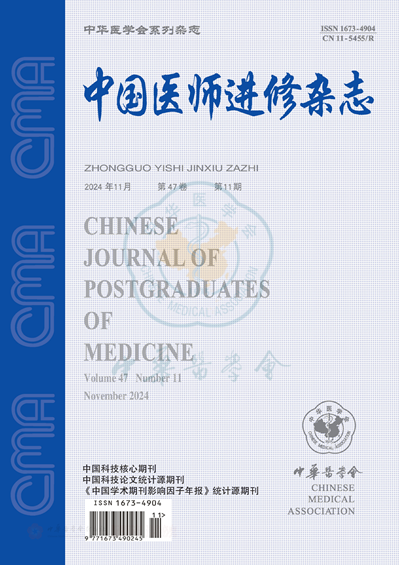Effects of propofol combined with remifentanil or sufentanil on cognitive function in patients undergoing awake craniotomy
引用次数: 0
Abstract
Objective To investigate the effect of propofol combined with remifentanil or sufentanil on cognitive function in patients undergoing awake craniotomy. Methods Sixty ASA Ⅰ or Ⅱ neurosurgical patients undergoing resection of glioma in cerebral cortical functional area were divided into 2 groups by random digits table: propofol + remifentanil (group RF, 30 cases) and propofol + sufentanil (group SF, 30 cases). Scalp nerve block and local infiltration of incision and dura mater were performed in both groups with 0.5% ropivacaine. Propofol, remifentanil and sufentanil were administered by target controlled infusion. The target plasma concentration of remifentanil was set at 1-2 ng/ml and that of sufentanil at 0.1-0.2 ng/ml,propofol was set at 3-6 μg/ml at open skull stage. The patients were inserted laryngeal mask and mechanically ventilated. Bispectral index (BIS) was monitored as the depth of anesthesia. Mini-mental scale examination (MMSE) was investigated at the time of preoperative,intraoperative wake-up after the patients had been targeted capacity. Results Blood concentration of propofol in group RF was (1.10 ± 0.06)μg/ml, group SF was (0.98 ± 0.05)μ g/ml in patients during intraoperative wake-up. BIS in group RF changed from 46.4 ± 2.5 to 90.8 ± 3.2 during wake-up, group SF from 44.8 ± 2.1 to 89.9 ± 3.2. The cognitive function score was not significantly different at the time of preoperative and intraoperative assessment. Conclusion Propofol combined with remifentanil or sufentanil has no effect on cognitive function for the patients undergoing awake craniotomy. Key words: Anesthetics,combined; Cognition; Wakefulness异丙酚联合瑞芬太尼或舒芬太尼对清醒开颅患者认知功能的影响
目的探讨异丙酚联用瑞芬太尼或舒芬太尼对清醒开颅术患者认知功能的影响。方法60例ASAⅠ或Ⅱ神经外科患者行脑皮质功能区胶质瘤切除术,按随机数字表法分为2组:丙泊酚+瑞芬太尼组(RF组,30例)和丙泊酚+舒芬太尼组(SF组,30例)。两组均应用0.5%罗哌卡因进行头皮神经阻滞和切口及硬脑膜局部浸润。靶控输注异丙酚、瑞芬太尼和舒芬太尼。开颅期瑞芬太尼靶血药浓度为1 ~ 2 ng/ml,舒芬太尼靶血药浓度为0.1 ~ 0.2 ng/ml,异丙酚靶血药浓度为3 ~ 6 μg/ml。患者均戴喉罩,机械通气。监测双谱指数(BIS)作为麻醉深度。在术前、术中唤醒患者达到目标容量后进行最小精神量表检查(MMSE)。结果术中唤醒时,RF组异丙酚血药浓度为(1.10±0.06)μg/ml, SF组为(0.98±0.05)μ g/ml。醒时RF组BIS由46.4±2.5增至90.8±3.2,SF组BIS由44.8±2.1增至89.9±3.2。术前和术中认知功能评分差异无统计学意义。结论异丙酚联用瑞芬太尼或舒芬太尼对清醒开颅患者的认知功能无影响。关键词:麻醉药;综合;认知;清醒
本文章由计算机程序翻译,如有差异,请以英文原文为准。
求助全文
约1分钟内获得全文
求助全文
来源期刊
自引率
0.00%
发文量
26239
期刊介绍:
Chinese Journal of Postgraduates of Medicine (founded in 1978, monthly) is one of the series of journals of the Chinese Medical Association (CMA) under the supervision of the National Health Commission of the People's Republic of China, sponsored by the Chinese Medical Association (CMA) and Dalian Institute of Theoretical Medicine (DITM). It is a core journal of Chinese science and technology, a statistical source journal of Chinese scientific and technical papers, and a statistical source journal of China Academic Journal Impact Factor Annual Report. The journal adheres to the purpose of using continuing medical education and post training, highlights new theories, new knowledge, new methods and new technologies, and focuses on the combination of theory and practice, and the combination of popularisation and improvement.
Main columns: Special tutorials, expert forums, clinical treatises, clinical experience, reviews and lectures, continuing medical education, teaching and research, advanced training forum, drugs and clinics, overview of progress, introduction of new technologies, imaging and clinics, lessons learnt, discussions and evaluations, case reports, discussions of clinical cases, conference proceedings, and domestic and international academic developments.
The main target readers are clinical medical personnel in internal medicine, surgery, gynaecology, paediatrics and ophthalmology.

 求助内容:
求助内容: 应助结果提醒方式:
应助结果提醒方式:


